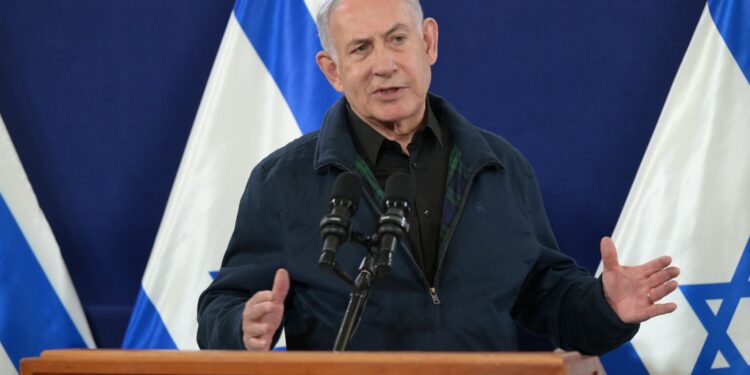Rejected calls for Palestinian sovereignty
Netanyahu Rejects Palestinian Sovereignty and US Two-State Efforts after talks with President Joe Biden. Netanyahu emphasizes Israel’s security needs, deeming them incompatible with Palestinian statehood. In a brief post in Hebrew, he states, “I will not compromise on full Israeli security control over all the territory west of Jordan.”
The mentioned territory includes Israel, the occupied West Bank, and Hamas-run Gaza. Israel is currently engaged in battles with the militant group Hamas following the October 7 attacks.
Creation of a Palestinian state with guarantees for Israel’s security
President Biden and top officials, including Secretary of State Antony Blinken, advocate for a Palestinian state with security guarantees for Israel. Their stance is presented as the key to achieving peace and stability in the Middle East.
United Nations Secretary General Antonio Guterres condemns opposition to a two-state solution, deeming it “unacceptable.” Guterres emphasizes that the denial of the right to statehood for the Palestinian people is also unacceptable.
The statements reflect ongoing international efforts to address the Israeli-Palestinian conflict through a two-state solution.
US, Egypt and Qatar Stance:
Reports suggest the US, Egypt, and Qatar seek Israel’s involvement in talks with Hamas. Netanyahu publicly rejects Hamas’ terms for releasing more Israeli hostages from Gaza.
Hamas’ conditions include ending the war, withdrawing Israeli forces from Gaza, and releasing more Palestinians from Israeli prisons. Netanyahu argues that agreeing to these terms would jeopardize the fallen soldiers’ sacrifice and compromise citizen security. The rejection highlights the challenges in reaching a resolution amid ongoing hostilities.
Global calls for a Palestinian state
Netanyahu’s comments reveal a rift with the US, Israel’s crucial ally, regarding Gaza’s post-conflict future. The complexity of Netanyahu’s position is exposed as he navigates international pressure for a Palestinian state and domestic demands for Israel’s security.
Far-right members in his coalition emphasize security, while the international community calls for a viable Palestinian state. Facing calls for early elections, Netanyahu is accused of prolonging the war for political reasons, with protests in Tel Aviv. War cabinet minister Gadi Eisenkot expresses hope that elections aren’t the motive but suggests they should occur within months.
Netanyahu’s statement on Palestinian sovereignty seemingly contradicts what he told President Biden a day earlier, as per CNN reporting. In a private call, Netanyahu had reportedly not ruled out the possibility of a Palestinian state, contrary to his public statement.
Biden Administration:
Biden administration officials have discussed the concept of a future demilitarized Palestinian state. President Biden reportedly finds the idea intriguing, suggesting openness to innovative solutions. Following a recent phone call with Netanyahu, their first in weeks, Biden expresses optimism.
Biden believes he could eventually persuade Netanyahu to consider some form of a two-state solution. He highlights various models of two-state solutions, citing UN member countries without their own military and states with limitations. Biden indicates a willingness to explore creative approaches to address the Israeli-Palestinian conflict.
Israel to retain security control over Gaza
Following Biden’s optimism, the Israeli prime minister’s office issues a statement. Netanyahu reiterates the policy that, after Hamas is destroyed, Israel must retain security control over Gaza.
The objective is to ensure Gaza will no longer pose a threat to Israel, a stance conflicting with the demand for Palestinian sovereignty. The statement underscores the ongoing challenges in finding a resolution to the Israeli-Palestinian conflict.
Biden and Netanyahu at odds
Biden and Netanyahu continue to publicly disagree on the future of Gaza post-Israel-Hamas war. Despite intense American efforts, Netanyahu Rejects Palestinian Sovereignty and US Two-State Efforts.
The divergence between the two leaders highlights persistent challenges in finding a conclusive resolution.
Goal of the international community
The two-state solution has been the international community’s goal for decades, tracing back to the 1947 UN Partition Plan. Many nations consider it the sole viable resolution to the Israeli-Palestinian conflict.
Post-war governance in Gaza remains uncertain, and Netanyahu has persistently opposed a two-state solution. Despite international contention, Netanyahu faces pressure from right-wing cabinet members with controversial suggestions.
Far-right Finance Minister Bezalel Smotrich advocates for a Palestinian exodus from Gaza, while National Security Minister Itamar Ben Gvir suggests resettlement outside the Gaza Strip. These proposals have caused outrage and underscore the complexity of finding a consensus on the region’s future.
















